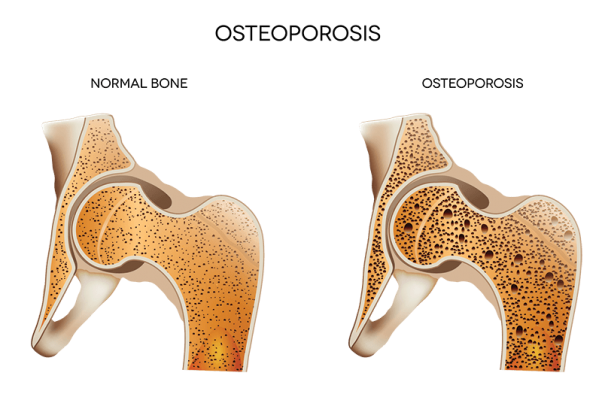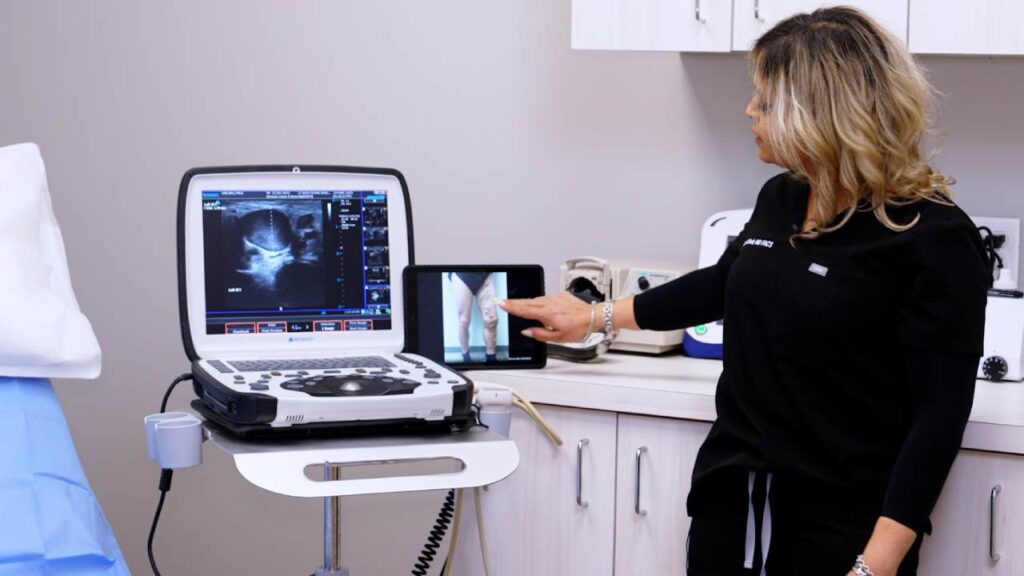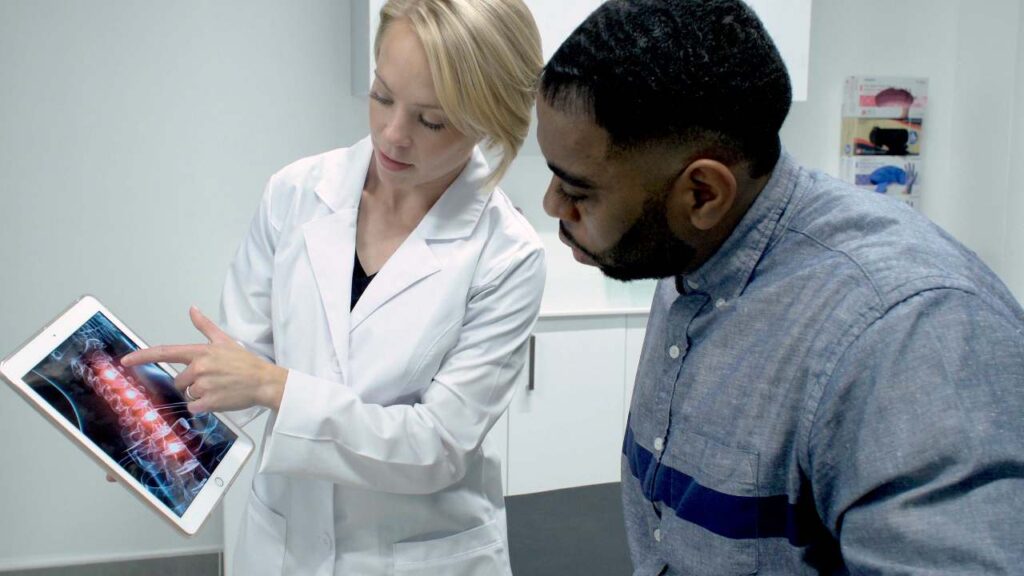Osteoporosis: An Abnormal Loss of Bone Density
Do you have a new ache or pain, and worry, “do I have osteoporosis?” Read on to learn more about the definition, signs and symptoms, causes, and treatments of osteoporosis. Osteoporosis is a disease of abnormally low bone mass. The word, “osteoporosis,” literally means, “porous bones.” The bones thin, weaken, and more easily fracture (break). Muscle spasms may also result as the muscles strain to carry the body’s crumbling frame. Osteoporosis is most commonly found in postmenopausal women (women who no longer have their periods) and elderly men. This is because bone density decreases with age (peak bone mass for men and women is reached by around age 30). Bone mass also decreases with the drop in estrogen levels that occurs with menopause.

Often, osteoporosis starts long before symptoms are noticed. In the early stages of the disease, subtle signs of osteoporosis include brittle fingernails, receding gums, weak grip strength, and feeling less physically fit. As the disease progresses, more serious signs arise, such as achy muscles, bone pain, stooped posture, loss of height, easily broken bones, and compression fractures of the spine.
While some osteoporosis risk factors and causes can’t be avoided, such as small body frame, Caucasian and Asian ethnicity, family history, female gender, menopause, and age, others can. You can support good bone health with a healthy diet and exercise. A diet rich in calories, protein, calcium, magnesium, and vitamin D is protective against osteoporosis. When dietary calcium intake is insufficient, calcium supplements and vitamin D and magnesium supplements can help to preserve bone mass. So can land exercises and strength training for at least 30 minutes three times a week. Certain medications, medical conditions and procedures, smoking, and drinking excessively (more than one alcoholic beverage a day for women and two for men) increase the risk of developing osteoporosis.
What Type of Doctor Can Help You Diagnose and Treat Osteoporosis?
If you have a new ache or pain and risk factors for osteoporosis, you can’t afford to delay treatment. Seeing a board certified pain doctor can help to treat your pain and any osteoporosis fractures and muscle spasms that might be causing it.
Pain medicine doctors have specialized training in preventing, diagnosing, and treating pain conditions such as osteoporosis. If you are looking for a premier pain management clinic, that accepts most health insurance plans, check out Pain Treatment Specialists. The pain doctors at Pain Treatment Specialists are Harvard-trained and board-certified with the American Board of Anesthesiology Pain Medicine. Pain Treatment Specialists are trained in the most advanced techniques and procedures to treat all types of pain, including pain from osteoporosis fractures and muscle spasms. Pain Treatment Specialists clinics are located in New York City, and in Clifton, Paramus and Wayne, New Jersey.
As the experts in pain medicine, pain specialists are uniquely equipped to deliver immediate, long-lasting results. Our team of skilled physicians includes Dr. George Hanna and Dr. Michael Nguyen. Each one of our doctors provides compassionate care, and cutting-edge pain medicine interventions. By scheduling an appointment with our specialists, you can begin to treat your pain immediately, and avoid major complications (e.g. hip fracture, spine fracture, upper arm or forearm fracture), and permanent damage from osteoporosis.
Why Visit VIP Medical Group in NY or NJ?
Upon arrival at one of our clinics, your pain doctor will meet you for your scheduled consultation. At this time, he or she will have the opportunity to talk with you about your overall health and your specific pain symptoms. After taking a medical history to get to know you and your pain better, your doctor will perform a physical examination with gentle and attentive bedside manner. He or she may even order some lab tests or imaging studies, such as an x-ray, or DEXA (dual-energy x-ray absorptiometry) scan. With this information, your doctor will be able to diagnose whether or not you have osteoporosis. He or she will then begin working with you on designing a treatment plan to best meet your needs. A wide array of osteoporosis prevention and treatment options are available, including medications and state-of-the-art, pain-relieving interventions.
Osteoporosis Neck, Back, and Hip Pain Treatments:
- Bisphosphonate Medication: a medication that slows bone breakdown and loss. This medication can be used to prevent and treat osteoporosis.
- Selective-Estrogen Receptor Modulator (SERM) Medication: an estrogen-like medication that protects bone from breakdown and loss. This medication can be used to prevent and treat osteoporosis.
- Denosumab Medication: a medication that inhibits the cells that cause bone breakdown and loss. This medication can be used to prevent and treat osteoporosis.
- Hormone Therapy: estrogen, parathyroid hormone, and thyroid hormone (calcitonin) therapies can all be used to prevent and treat osteoporosis.
- Cervical and Lumbar Epidural: Pain physicians administer cervical or lumbаr еріdurаl, a combination of a corticosteroid injection and local anesthetic medication, to treat neck, low back, and leg pain.
- Cervical and Lumbar Facet Injection: Corticosteroid injections delivered by a pain doctor into the facet joints of the spine can reduce pain and swelling of your back and neck.
- Lumbar Radiofrequency Ablation: When other treatments fail to provide lower back pain relief, pain doctors turn to radiofrequency ablation of the lumbar spinal nerves. This treatment involves lumbar spinal nerve block and removal using radiofrequency. It is performed at affected facet joints of the spine.
At the end of your visit, you will meet with a member of our billing department. She will help explain to you your treatment insurance coverage and benefits. Before any treatment is done, you will be given a detailed outline of how much you will owe (if anything). We will work directly with your insurance company to help you get treated as soon as possible. You can rest assured that there will be no surprise bills or hidden costs. Schedule an appointment with one of the best pain physicians in NY and NJ for an osteoporosis consultation today.







